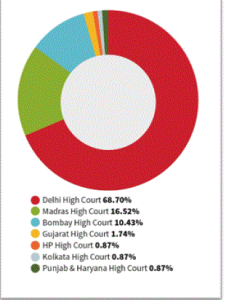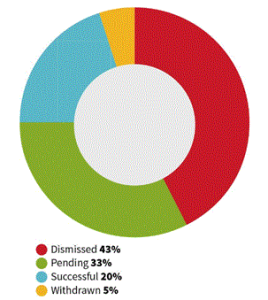- AI
- Arbitration
- Asia
- Automobile
- Bangladesh
- Banking
- Biodiversity
- Biological Inventions
- bLAWgathon
- Brand Valuation
- Business
- Celebrity Rights
- Company Act
- Company Law
- Competition Law
- Constitutional Law
- Consumer Law
- Consumer Protection Authority
- Copyright
- Copyright Infringement
- Copyright Litigation
- Corporate Law
- Counterfeiting
- Covid
- Design
- Digital Media
- Digital Right Management
- Dispute
- Educational Conferences/ Seminar
- Environment Law Practice
- ESIC Act
- EX-Parte
- Farmer Right
- Fashion Law
- FDI
- FERs
- Foreign Law
- Gaming Industry
- GDPR
- Geographical Indication (GI)
- GIg Economy
- Hi Tech Patent Commercialisation
- Hi Tech Patent Litigation
- IBC
- India
- Indonesia
- Intellectual Property
- Intellectual Property Protection
- IP Commercialization
- IP Licensing
- IP Litigation
- IP Practice in India
- IPAB
- IPAB Decisions
- IVF technique
- Judiciary
- Khadi Industries
- labour Law
- Legal Case
- Legal Issues
- Lex Causae
- Licensing
- Live-in relationships
- Lok Sabha Bill
- Marriage Act
- Maternity Benefit Act
- Media & Entertainment Law
- Mediation Act
- Member of Parliament
- Mergers & Acquisition
- Myanmar
- NCLT
- NEPAL
- News & Updates
- Non-Disclosure Agreement
- Online Gaming
- Patent Act
- Patent Commercialisation
- Patent Fess
- Patent Filing
- patent infringement
- Patent Licensing
- Patent Litigation
- Patent Marketing
- Patent Opposition
- Patent Rule Amendment
- Patents
- pharma
- Pharma- biotech- Patent Commercialisation
- Pharma/Biotech Patent Litigations
- Pollution
- Posh Act
- Protection of SMEs
- RERA
- Section 3(D)
- Signapore
- Social Media
- Sports Law
- Stamp Duty
- Stock Exchange
- Surrogacy in India
- TAX
- Technology
- Telecom Law
- Telecommunications
- Thailand
- Trademark
- Trademark Infringement
- Trademark Litigation
- Traditional Knowledge
- UAE
- Uncategorized
- USPTO
- Vietnam
- WIPO
INTRODUCTION
Intellectual Property Rights, a set of technical rights giving rise to exceptionalism under patent law which has increasingly become a specialized field. The problem of abusive patent litigation has diverted the patentee’s attention from innovation to fighting against “patent trolls”. Through this research article, the authors try to emphasis on the need of judicial specialization related to patent cases at the administrative level by inoculating substantive expertise at the executive and legislative level to develop codes of criminal procedure and penalization, to prosecute infringers.
Recent abolishment of the Indian Intellectual Property Appellate Board (IPAB) has raised concerns over the future of Patent Litigation,[1] which shall be addressed by this paper.

Pie-chart 1: Preferred Forum for Filing Patent Litigation Since 2005.
Pie-chart 2: IPAB decisions on applications.
[Image Source : I Am Media Dot Com ]
REVIEW OF LITERATURE
Various articles of literature have been published on Patents being a specialized field of law which analyse the issue through different standpoints. The authors reviewed the following literature:
- Gene Sperling in “Taking on Patent Trolls to Protect Innovation”[1] studies the impact of abusive patent litigation on the economy and innovative minds. He also mentions the stifling effect on the business operations of the patentee due to the threat of legal battle but certainly the article lacks solutions to overcome the issue which shall be addressed by the authors in their research paper.
- Li Ming Li in his article “Do specialized intellectual property courts show a pro-patent propensity?”[2] emphasises on the importance of an effective judicial system to overcome Patent Litigation. The empirical research shows that specialized courts have an improved rate of judgements, appeals and fewer errors, the authors draw support from the conclusions of this paper while adding their own ingenious viewpoints and solutions on the same.
- Timothy B. Lee in “Specialist Patent Courts Are Part of The Problem”[3] mentions the counter productiveness of a specialized court which gave rise to trivial cases. He also discusses the ‘influence of the patent bar over patent law’. But the author through their ground-breaking recommendations attempt to overcome such negatives and by conducting an “experts only” survey for further data analysis upon the need of Specialized Patent Trial Courts.
- Elizabeth Connors in her paper “Specializing District Courts for Patent Litigation”[4] talks about “Patent Pilot Program” operational in the United States that has been injudicious in patent law jurisprudence. The authors of this paper try to lay out recommendations and give a new construal to the program that would suit the Indian Patent Law and its jurisprudence.
- In an important “Study on Specialized IPR Courts”[5], Rohazar Wati Zuallcobley raises various crucial questions such as, if investment by government on specialized courts is justified, if there is enough intellectual property litigation to rationalize the need of specialized courts, if the nation has competent adjudication, but fails to answer them. The authors of this research paper critical analyse and attain resolutions of the same.
- Saiesha Dhawan in her article “The Aftermath of Change: The Abolishment of the IPAB”[6] censures the lack of uniform IP Judicial System in India, raises questions as to how abolishment of Intellectual Property Appellate Board (IPAB) will be dealt with in upcoming decades, while the authors of this paper support this contention, they focus on finding and recommending solutions to fight against the hypothesis.
ISSUES
The authors through this research paper address the following issues:
- Lack of expert judges to judicially interpret Patent Law leading to inefficient decisions proving to be counterproductive.
- With the abolishment of Intellectual Property Appellate Board (IPAB), the burden on High Courts accentuates the multitude of pending cases, giving rise to multiplicity of suits and conflicting decisions.
- The need to establish a code of criminal procedure to penalize the infringers.
- To substantiate upon the viability of establishing Specialized Trial Courts that harmonise with the Indian Patent Jurisprudence.
OBJECTIVES
The objective of the research paper is to solve the abovementioned issues, in furtherance of:
- Examining the prospect of establishing specialized trial courts for a subject of law that requires special understanding and interpretation of various sciences.
- Emphasizing on solving the complexities that the judiciary has had been facing in regards to deciding patent cases.
- To provide an overview of the efficacious Intellectual Property Appellate Board, which was abolished intruding the Indian Judiciary and its functioning.
- Stipulate security of the patentee’s rights by setting up a penal code to reprimand infringers.
- Elucidate the following benefits of Specialized Courts:
- Effectiveness of decision;
- Enhanced efficiency and accuracy;
- Uniformity and predictability of case outcome;
- Progressive dynamism;
- Inculcating confidence in the commercial community, increasing the prospect of foreign investment and economic growth.
METHODOLOGY
The research methodology used for the research article is Doctrinal as well as non-Doctrinal, it is a compilation and analysis of various academic sources including research papers, news reports, data accounts and articles. It is also an empirical-research of qualitative and quantitative data and interpretation of existing legislations. The Non-Doctrinal method shall be employed by conducting an “experts only” survey to analyse the reasons behind failure of Patent Tribunals and the need of Specialized Patent Trial Courts.
CONCLUSION / OUTCOME – RECOMMENDATIONS
To conclude, this paper, hence seeks to explore the viability of:
- Emancipating Specialized Administrative Expertise;
- Clarity on criminalizing patent infringement;
- Set up dedicated Fast Track Trial Courts to address Patent cases and infringement of patentee’s rights –
- In the age of digitalization, the scope of digital infringement needs to be addressed so as to reduce the fraudulent e-use and legitimize digital rights of the patentee.
- These specialized trial courts set up should act in consonance with the patent rules and an established criminal procedure to ensure deterrence of crime and punishing the offenders.
- Have expert judges and lawyers to assist the patentee in protecting his rights.
- Promoting ethical use of patents through assignments[7] and licences[8].
- Surge in court fee under Specialized Courts, as a deterrence against patent trolls.
- Resolving patent infringements through Alternative Dispute Resolution (ADRs) which would enhance business opportunities and protect the patentee from future breach of contract.
In conclusion, the findings in the paper show that slow amendment rate of the statute does not stand the dynamism of the subject matter. It is thus advisable that there are criminal regulations and safeguards put in place through Specialized Courts, in line with the above recommendations so that it contributes to dynamic evolution of law, economic growth and efficiency of Indian Legal System.
Author : Sejal Tiwari, in case of any queries please contact/write back to us via email to chhavi@khuranaandkhurana.com at Khurana & Khurana, Advocates and IP Attorney
[1] Nalini Sharma, “Scrapping of the IP tribunal: The good, the bad and the ugly”, India Today, Apr 12, 2021 17:50 IST,
[2] Gene Sperling, “Taking on Patent Trolls to Protect Innovation”, Gov. Archives, 4th June 2013,
[3] Li-MingLi, “Do specialized intellectual property courts show a pro-patent propensity? Evidence from China”, International Review of Law and Economics, Vol. 70, ISSN 0144-8188, 2022,
[4] Timothy B. Lee, “Specialist Patent Courts Are Part Of The Problem”, Forbes, 19th Aug 2011, 11:05AM,
[5] Elizabeth Connors, “Specializing District Courts for Patent Litigation”, Case Western Reserve Law Review, Vol. 69 Issue 3, 2019, Pg. No. 771-804.
[6] Rohazar Wati Zuallcobley, “Study on Specialized Intellectual Property Courts”, International Intellectual Property Institute and United States Patent and Trademark Office, 25th January 2012,
[7] Saiesha Dhawan, “The Aftermath of Change: The Abolishment of the IPAB”, Excelon IP, 23rd Dec 2021,
[8] § 68 of the Patents Act, 1970, Act No. 39 of 1970.
[8] § 70 of the Patents Act, 1970, Act No. 39 of 1970




